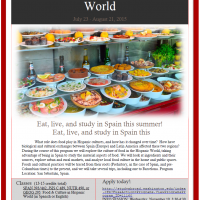Are you interested in a career in the sciences? Would you like to:
- Explore a wide variety of careers available to students with a broad science background?
- Network with professionals in science careers, including science education, science writing, and science policy?
- Learn about successful pathways to careers in science, as well as the skills required for those careers?
Weekly guest speakers in INTSCI 301 expose students to a variety of possible careers and provide students with tips and insight based on their own careers in the sciences. Students complete a final “field experience” consisting of a visit and informational interview with someone working in the sciences.
Open to undergraduates at all levels with an interest in learning more about science careers.
Here’s what some of our previous students had to say about the class:
“The field experience exposed me to a career I didn’t even know existed! This class should be required for all science majors. I wish I had taken it when I first came to the UW.”
“This class was a very pleasant surprise. It proved to be helpful in areas other than just exploring science careers.”
“Having guest speakers come in from different fields is really awesome and gives lots of different perspectives.”
INTSCI 301 will meet on Wednesdays, 3:30-4:50 p.m. For registration questions, please email Meghan Oxley, Integrated Sciences Adviser, at: what@uw.edu.

